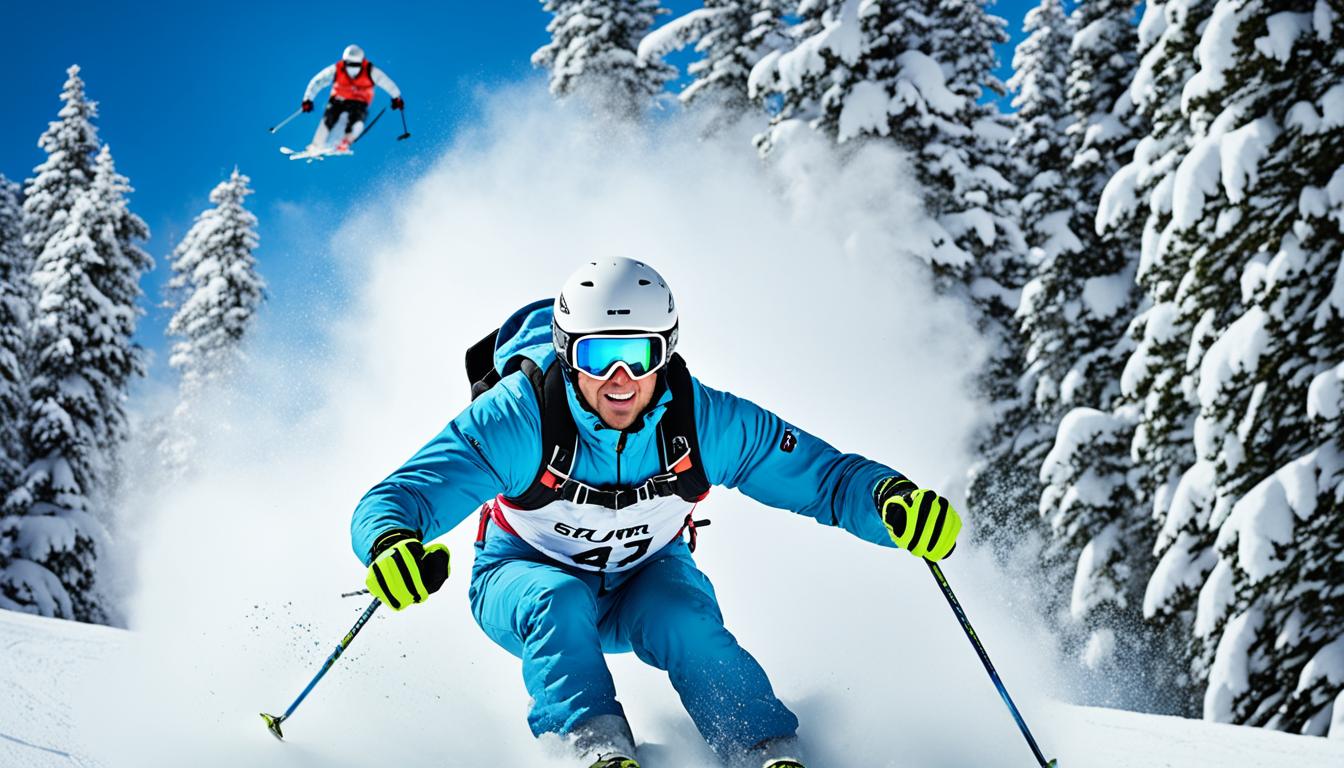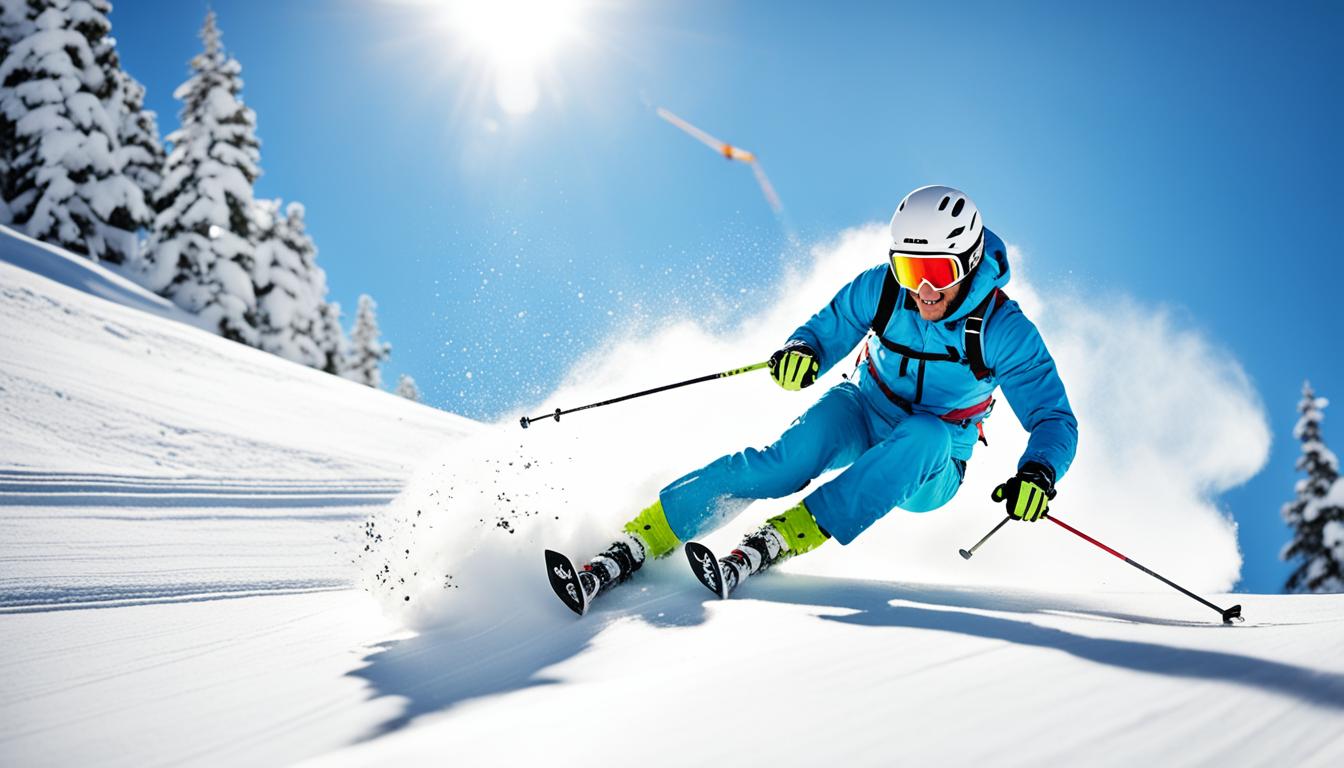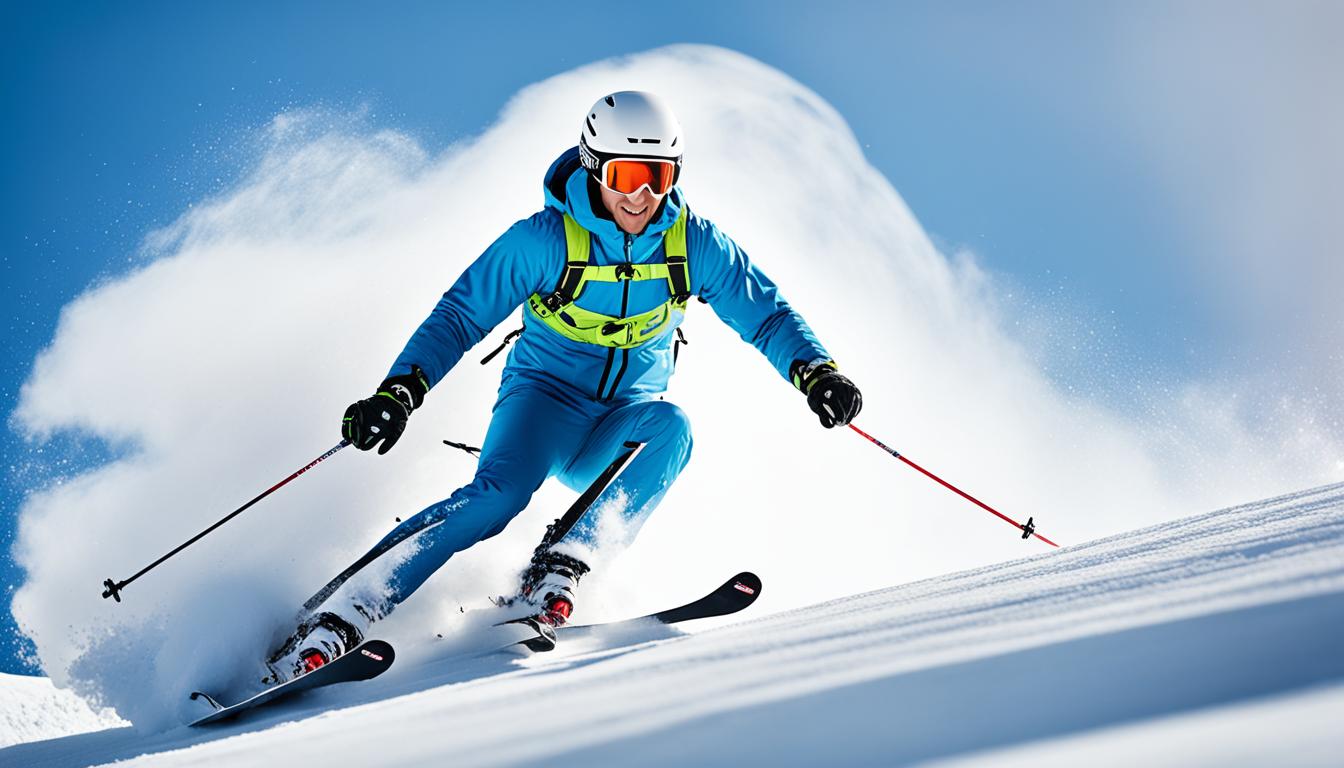Welcome to our beginner’s guide to conquering skiing! We understand that skiing can be an exhilarating yet daunting experience for those new to the sport. That’s why we’re here to provide you with valuable tips, techniques, and insights to help you overcome common challenges and make the most of your skiing adventure.
Whether you’re a complete novice or have had a few ski trips under your belt, we’ve got you covered. Our aim is to equip you with the knowledge and skills necessary to ski with confidence and ease. Let’s dive into some essential ski tips for beginners and beginner skiing techniques that will set you on the right track.
Key Takeaways:
- Overcome common ski challenges with a growth-oriented mindset
- Set clear goals and purpose to stay motivated
- Accept fear and analyze past accidents to understand your limitations
- Use tension to improve your ski performance
- Highlight the positive aspects of your progress
With these insights in mind, we’re confident that you’ll be able to conquer any challenges that come your way and enjoy the thrill of skiing. So grab your gear, hit the slopes, and let the adventure begin!
Accepting Fear and Analyzing Accident Situations
Fear can be a powerful emotion, especially when it comes to skiing. But accepting fear is the first step in overcoming it. By giving fear a name, we can confront it head-on and understand its purpose. This allows us to approach fear more rationally, rather than letting it control our actions.
One effective way to confront fear is by analyzing past accident situations. Looking back at what went wrong can provide valuable insights into our skiing skills and techniques. By understanding the causes of accidents, we can take proactive steps to improve and prevent similar situations in the future.
When analyzing accident situations, it’s important to focus on learning, rather than dwelling on negative experiences. By viewing accidents as opportunities for growth, we can turn fear into a catalyst for improvement. This mindset shift enables us to develop a better understanding of our fears and find strategies to overcome them.
“Analyzing past accidents helps us identify areas for improvement and empowers us to make positive changes in our skiing abilities.”
For example, imagine you had a skiing injury in the past that now causes fear of skiing after injury. By analyzing the accident, you may realize that it was due to improper technique or pushing beyond your limits. Armed with this knowledge, you can work on honing your skills, taking lessons, and gradually rebuilding your confidence on the slopes.
Remember, accepting fear and analyzing accidents are crucial steps in our journey to overcome fear in skiing. It allows us to gain valuable insights, learn from our experiences, refine our techniques, and ultimately build the confidence needed to fully enjoy the exhilarating sport of skiing.
| Tips | Description |
|---|---|
| Give fear a name | By identifying and acknowledging our fears, we can confront them effectively. |
| Understand the purpose of fear | Fear is a natural response that helps protect us. Understanding its purpose helps us approach it more rationally. |
| Analyze accident situations | By examining past accidents, we can gain insights into what went wrong and how to improve. |
| Focus on learning and growth | Instead of dwelling on negative experiences, view accidents as opportunities for growth and improvement. |
| Seek professional guidance | If needed, consider taking lessons or working with a ski instructor to refine your skills and techniques. |
Using Tension and Highlighting the Positive
Tension before skiing can be both intimidating and exhilarating. However, by understanding how to harness this tension, we can turn it into a powerful tool for enhancing our performance on the slopes. Instead of letting fear consume us, we can use tension to push ourselves further and overcome our doubts.
One way to harness tension is to view it as an opportunity for growth. By embracing the challenge and seeing it as a chance to stretch our limits, we can shift our perspective from fear to excitement. This positive mindset empowers us to face our fears head-on and conquer them.
Highlighting the positive aspects of skiing is another technique to build confidence and overcome fear. Remind yourself of those moments when you successfully recovered from an injury or conquered a difficult slope. By focusing on these achievements, we can boost our confidence and promote a more positive mindset.
“Every time I conquer a fear on the slopes, it gives me an incredible sense of accomplishment. It reminds me that I am capable of so much more than I thought. Each victory fuels my confidence and makes me excited to tackle new challenges every time I hit the slopes.”
Additionally, surrounding ourselves with positive influences can make a significant difference in our skiing experience. Ski with friends who encourage and support us, and seek out instructors who understand the importance of building confidence in skiing. Their guidance and positive energy can help us overcome our fears and reach new heights.
By using tension as a tool for growth and highlighting the positive aspects of our skiing journeys, we can build our confidence and overcome fear with each turn on the slopes.

The Power of Positive Thinking
Positive thinking plays a crucial role in overcoming fear and building confidence in skiing. When we approach each run with an optimistic mindset, we open ourselves up to new possibilities and potential growth. Positive thinking allows us to believe in our abilities and trust that we can conquer any challenge that comes our way.
Moreover, positive thinking helps us reframe setbacks as opportunities for learning and improvement. Instead of dwelling on our mistakes, we can use them as stepping stones towards becoming better skiers. By focusing on the lessons learned and the progress made, we can maintain a positive outlook and continually strive for personal growth.
So, the next time you feel doubt creeping in, remember the power of positive thinking. Choose to focus on the positive aspects of your skiing journey, harness the tension within you, and confidently glide down the slopes, knowing that you have the skills and determination to overcome any fear that stands in your way.
| Technique | Benefits |
|---|---|
| Viewing tension as an opportunity for growth | – Shifts fear to excitement – Empowers us to face fears – Pushes us to reach our limits |
| Highlighting the positive aspects of skiing | – Boosts confidence – Promotes a positive mindset – Reminds us of past achievements |
| Surrounding ourselves with positive influences | – Encourages and supports our progress – Provides guidance from experienced skiers – Creates a positive skiing environment |
Starting Small and Helping Others
When it comes to conquering your fears and building confidence in skiing, starting small can make a big difference. By gradually progressing and skiing at a level slightly below your ability, you can regain confidence and overcome any apprehension you may have. Taking small steps allows you to build a solid foundation and gradually increase your skills and comfort on the slopes.
But it’s not just about your own progress; helping others can be incredibly beneficial for both them and you. Skiing with beginners and providing guidance and support can not only boost their confidence but also distract you from your personal fears. By focusing on helping others overcome their own challenges, you can gain a sense of fulfillment and develop a deeper understanding of the sport.
Whether it’s skiing side by side with a friend who is just starting out or volunteering as a ski instructor, helping others overcome fear can be a rewarding experience. It allows you to share your knowledge and passion while also reinforcing your own skills. Teaching others forces you to break down techniques and concepts, helping you further understand and master them yourself.
Remember, skiing is not just an individual sport; it’s a community of enthusiasts who share a love for the mountains. By starting small and helping others, you not only build your own skills and confidence but also contribute to the growth and support of the skiing community as a whole.
“Skiing with beginners is an opportunity to spread the joy and excitement of the sport while also building your own confidence and skills.” – Ava Thompson, Professional Skier
The Benefits of Starting Small and Helping Others:
- Gradually build confidence and overcome fears
- Develop a solid foundation of skills
- Feel a sense of fulfillment by helping others
- Reinforce your own knowledge and techniques
- Contribute to the growth and support of the skiing community
| Starting Small | Helping Others |
|---|---|
| Gradually progress and regain confidence | Boost others’ confidence and distract yourself from fears |
| Build a solid foundation and increase skills | Share knowledge, reinforce skills, and deepen understanding |
| Experience small successes and build momentum | Contribute to the growth and support of the skiing community |
Conclusion
Overcoming common ski challenges for beginners requires a combination of strategies and a growth-oriented mindset. By accepting fear, analyzing past accidents, using tension, highlighting the positive aspects, starting small, helping others, and enjoying the surroundings, we can conquer our fears and thrive on the slopes.
Skiing is a sport that demands resilience, but with the right mindset and approach, we can overcome challenges and enjoy the thrill of skiing. It is important to remember that every challenge is an opportunity for growth. By accepting fear as a natural part of the learning process, we can approach it more rationally and develop the skills to overcome it.
Analyzing past accidents provides valuable insights into our weaknesses and areas for improvement. By addressing these areas and working on our skills and techniques, we can build confidence and overcome fear. Moreover, using tension to our advantage and highlighting the positive aspects, such as successfully recovering from an injury, can boost our confidence and promote a more positive mindset.
Starting small and progressively challenging ourselves allows us to gradually build confidence and conquer our fears. Additionally, helping others overcome fear not only provides a sense of fulfillment but also distracts us from our own fears and encourages us to focus on the success and growth of others.
In conclusion, by adopting a growth-oriented mindset, using effective strategies, and embracing the challenges that come with skiing, we can overcome common ski challenges and build resilience on the slopes. Let us remember that resilience is not the absence of challenges, but the ability to face and overcome them, ultimately leading to a rewarding and exhilarating skiing experience.
FAQ
How can I overcome my fear of skiing as a beginner?
To overcome your fear of skiing, it’s important to accept your fear and understand its purpose. Analyzing past accident situations can also provide insights into what went wrong and help you work on improving your skills and techniques.
Can tension be useful in improving my skiing performance?
Yes, tension before skiing can be beneficial if harnessed correctly. By viewing tension as a tool to enhance performance, you can overcome fear and improve your skiing abilities. Highlighting the positive aspects of skiing, such as successfully recovering from an injury, can also boost your confidence and promote a more positive mindset.
How can I build confidence as a beginner skier?
Starting small is an effective strategy for building confidence in skiing. By gradually progressing and skiing at a level slightly below your ability, you can regain confidence and conquer your fear. Additionally, helping others overcome fear can provide a sense of fulfillment and distraction from your own fears, further boosting your confidence.
What are some tips for beginners to overcome common ski challenges?
Beginners can overcome common ski challenges by accepting fear, analyzing past accidents, using tension to enhance performance, highlighting the positive aspects of skiing, starting small and gradually progressing, helping others overcome fear, and enjoying the surroundings. By adopting a growth-oriented mindset and utilizing these strategies, beginners can conquer their fears and thrive on the slopes.
How can I develop resilience in skiing?
Building resilience in skiing requires a combination of strategies and a growth-oriented mindset. By accepting fear, analyzing accidents, using tension, starting small, helping others, and enjoying the surroundings, you can develop resilience and overcome challenges in skiing. Remember that skiing is a sport that demands resilience, but with the right mindset and approach, you can conquer your fears and enjoy the thrill of skiing.




